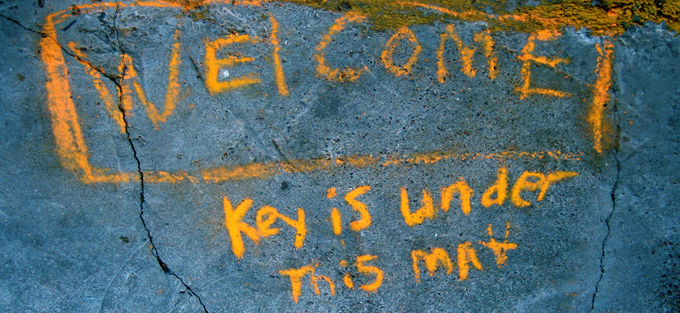by Emily Ewing
Growing up, I knew several people who had immigrated to the United States because they worked for my dad. When I went to college, I met people who came to the United States for school. During college I moved to Argentina to study abroad. After I graduated, I immigrated to Slovakia to serve in the ELCA Young Adult in Global Mission program.
Through my encounters with people from cultures different from my own, I began to perceive the world in new ways. New languages made me more aware of the words I use and the power that they hold. I became aware of the discrimination behind the use of the word “illegal.” I learned the negative implications of using the phrase, “I was gypped,” with people of Roma heritage throughout the world.
I realized that words can have an emotional impact. I also realized that I will never be able to get them all right. and That’s OK as long as I am also willing to admit when I say the wrong thing.
Celebrating our differences
 Eating different foods made me think about what I ate and where it came from. I realized that it takes a lot of work by many people to get food to my table. Whether they are tending, growing, or harvesting it, those people are vital to the process and they also need food of their own.
Eating different foods made me think about what I ate and where it came from. I realized that it takes a lot of work by many people to get food to my table. Whether they are tending, growing, or harvesting it, those people are vital to the process and they also need food of their own.
I gained a broader appreciation for life and the world. I could no longer be blissfully oblivious to the ways my country, the United States of America, affects the rest of the world. I also learned some of the ways in which people who have immigrated to the U.S.—both with official documentation and without—positively contribute to our country.
Through these experiences of living in different countries, I learned that we are better both individually and as communities when we can celebrate our diversity and learn from each other’s diversity. In order to do that, we need to recognize each other not only as fully human, but also as beloved children of God. We need to share our stories and let others know about the importance of immigration reform. We need to value those who emigrate from one country to another.
Taking action
In the past year I have had the opportunity to speak with state and federal representatives on several issues regarding immigration reform and creating a more humane and inclusive path for immigration.
I told a story about my friends, a same-sex couple who had married in Argentina, but since only one was a U.S. citizen, they were not permitted to live in the United States because in the state that they wished to reside, their marriage was not recognized as legal.
I shared stories of the women I worked with following the U.S. Immigration and Customs Enforcement (ICE) raid in Postville, Iowa in 2008
Jesus’ message
The stories I told were short and to the point about real people, children of God, no longer others or “aliens.” Just as Sarah and Abraham provided hospitality to three strangers in the Old Testament, in Matthew 25, we are reminded to welcome and care for the stranger. When we advocate for and with those who have immigrated to this country, we advocate for and with Christ.
Issues related to immigration are often not clear or easy to discern, yet in Christ we trust that God’s love and grace for every one of us is the measuring stick. By that love and grace we are freed to proclaim God’s love for everyone and to help ensure that every beloved child of God can live their life—not merely surviving or scraping by, but living with human dignity.
We will mess up. Our words will not always fit or sound right but the Holy Spirit binds us together into a common destiny and in her we trust. In God we find freedom, grace, and love to be bold in our advocacy and our voice.
Discussion Questions
1. How have you experienced the power of words? Are there words that hold special meaning for you? How might you be more aware of the impact of the words you use in your interactions with others this week?
2. When have you tried new food or shared a meal with someone? How can food be a vehicle for conversation and learning with and about others?
3. Who are the people who influence the stories you tell about and the ways you understand immigration? How and to whom can we tell stories about the impact of immigration legislation on ourselves, and our sisters and brothers, in ways that affect change?
Closing prayer
Spirit of the living God, speak words of wisdom, life, and grace to us. Gather us together around your table to share in the diversity that is abundant life with you. Grant us courage and vulnerability to learn, share, and speak your truth from and to those around us. We ask all this in your Son’s name and for love’s sake. Amen.
Emily Ewing is originally from Vail, Colo. She recently returned from internship at Immanuel Lutheran Church in Kansas City, Mo., and is a senior working toward her Masters of divinity at the Lutheran School of Theology at Chicago.


As I await the asylum proceedings for my “daughter and grandson” during a government shut-down, the United States continues to discount the needs of immigrants. Thank you, Emily Ewing, for raising important concerns for us through Café.